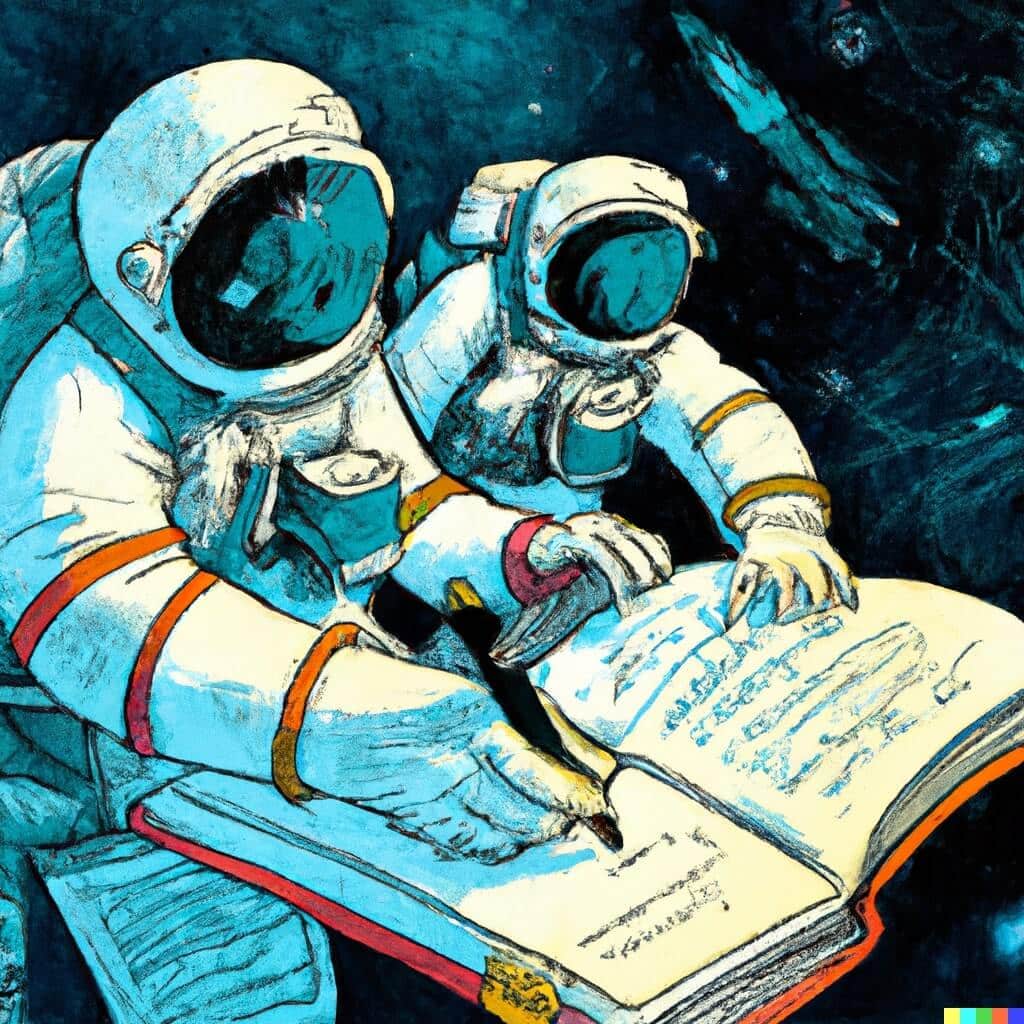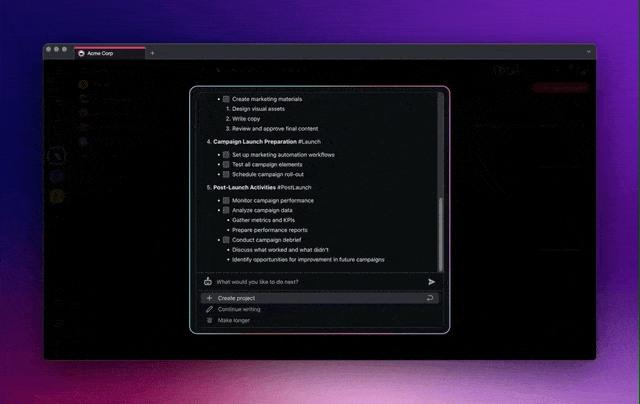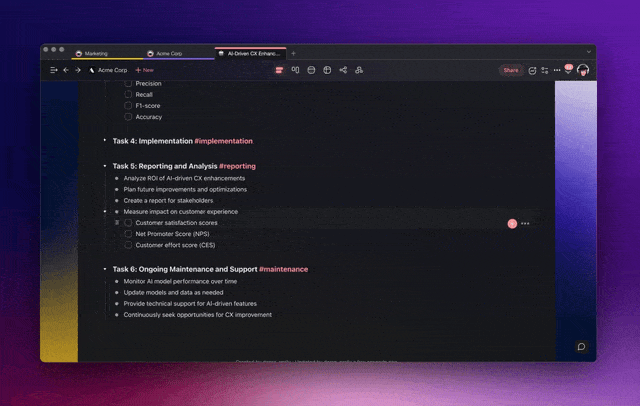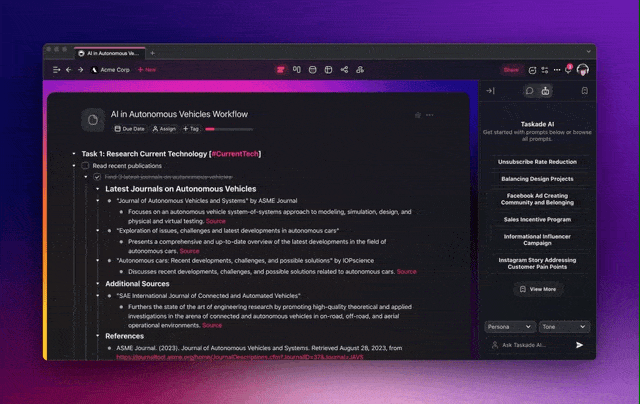AI Predictive Project Management for Enhanced Productivity in 2024
Only 29% of companies complete their projects on time and barely a half can stay in the green. Tough, right? Managing projects is rarely smooth sailing, but you...
Only 29% of companies complete their projects on time and barely a half can stay in the green. Tough, right? Managing projects is rarely smooth sailing, but you can up your odds of success with a dose of planning and AI on board. Let’s talk about predictive project management.
🔮 What Is Predictive Project Management?
Legend has it that in the heat of the space race, NASA spent millions to develop a pen that could write in zero gravity. The Soviets? They used pencils. In the end, both the U.S. astronauts and the Soviets in their Soyuz capsules got to doodle and take notes in space.(1)
*(The "Space Pen" was indeed developed by an American named Paul C. Fisher, but not directly by NASA. Fisher invested his own money and only after its invention did NASA adopt it.)

Here’s the thing. Even garden-variety projects (anything is compared to space exploration) are a romance of careful preparation and happy improvisation. But everything starts with planning.
Predictive project management is a structured approach to overseeing and executing projects that relies on thorough planning, data analysis, and forecasting. It’s like having a detailed roadmap before setting off on a journey, but for projects. It's a contrasting approach to adaptive project management where adaptability is key, and rigid plans take a backseat.
| 🔥 Adaptive Approach | 💭 Predictive Approach | |
|---|---|---|
| Planning Approach | Iterative and incremental. | Detailed planning upfront. |
| Response to Change | Welcomes change as an opportunity. | Avoids or tightly controls changes. |
| Feedback & Involvement | Frequent feedback; ongoing stakeholder involvement. | Limited feedback; stakeholders involved at key milestones. |
| Best Suited For | Projects with high uncertainty, like software development. | Defined projects with low change likelihood, like construction. |
Predictive project management isn’t inherently better than more agile approaches. But it offers a set of unique benefits if you’re working on projects with well-defined requirements and scope.
Clarity and Visibility: With a predictive approach, the answers are there from the start. Everyone's on the same page. Expectations are set, and there's a roadmap to follow. No guessing games or surprises. It's a clear vision from start to finish.
Efficient Resource Allocation: Whether it’s time, money, or manpower, you know what you need from the start. With predictive planning, every resource has its place. It's like having the perfect recipe with exact measurements and steps.
Standardization: The cookie-cutter approach may be boring, but it gives you something more flexible strategies don’t — consistency. Every step is well-defined and follows a proven pattern. You know what to do on each project stage, and so does your team.
Reduced Risk: There are no risk-free projects. But going over the good, the bad, and the worst scenarios will save you some sleepless nights. Predictive planning is like having a safety net. You're prepared for hiccups, and there's a plan for every stumble.
The benefits are compelling. But there is one more secret ingredient we need to add to the mix.
Enter artificial intelligence.
🤖 + ⚙️ How AI Can Be Used in Predictive Project Management
AI systems have been around for decades. They've been used in everything from predicting weather patterns to, well… recommending that cat video you didn't know you needed at 2 a.m.
(don’t worry, we’ve all been there)
But ever since the GPT-3 and GPT-4 large language models' debut, AI has gone mainstream. It no longer lurks in the shadows of research labs, tech hubs, and your favorite streaming services. That genie is out of the bottle, powering tools, apps, and services that make your work easier.
So, what's the place of AI in project management?
Let's say you're in charge of rolling out an e-commerce platform for a retail brand. Inventory integration, user experience design, and seasonal traffic spikes are only some of your worries. You can lose your mind trying to manage multiple vendors, ensure database compatibility, navigate API integrations, ensure server stability… or you can bring AI on board to help you out.
AI tools for project management can help you and your project team with risk assessment, allocating project resources, setting schedulkes, and forecasting budgets, just to name a few.
| ✅ Without AI | ❌ With AI |
|---|---|
| Manual checks for SEO. | AI scans content, ensuring top SEO rankings |
| Endless device testing. | AI tests across devices, flagging inconsistencies. |
| Panic during traffic spikes. | AI preemptively scales for optimal performance. |
| Manual troubleshooting. | AI-driven solutions suggest fixes. |
| Trying to anticipate bugs. | AI scours bug history to predict future glitches. |
| Get bottlenecked by guesswork. | Boost project cadence with predictive analytics. |
Instead of spending hours, days, or weeks planning the perfect roadmap, setting milestones and deadlines, assigning tasks, or budgeting, you can get AI to do the heavy lifting for you.
But while AI might be the brains behind the operation, the devil is in the details. Or, in this case, the AI tools you end up using to prop up your project management efforts.
And this takes us to Taskade AI.
🐑 The Benefits of Using Taskade AI for Project Management
Taskade AI is a powerful project management and collaboration platform for individuals and teams. It combines the simplicity of a to-do list app and the versatility of a collaboration platform (chat and video-calling included), with a dash of AI magic sprinkled on top.
Here’s how it can help you make sure your projects are up to scratch.
Research
"Have we defined the project scope down to the last detail?"
"What's the most significant risk that could throw our timeline off?"
"How did we end up 20% over budget in a week?"
"What's our backup plan? And the backup for the backup?"
Let’s face it. You can’t predict everything, but there are things you can do to keep your projects on track. And one of those things is doing your homework and asking the right questions.
Taskade let's you deploy a team of 🤖 Custom AI Agents that will do the heavy lifting for you. Agents can be anything you want, from a research assistant to an experienced project manager. They will scope out market trends, spy on your competitors, and help you push projects forward.
Generate
Whether you’re a seasoned project manager or have only a handful of projects under your belt, there are some repetitive, mundane tasks you need to deal with before you kick off a project.
Defining the project scope
Conducting a stakeholder analysis
Setting project objectives
Creating a Work Breakdown Structure (WBS)
Determining task hierarchies
Resource planning and budgeting
Establishing communication protocols
… and the list goes on and on. The problem is that those tasks take a lot of time you could spend on more rewarding activities like fostering team collaboration.
But you don’t have to set things up manually. The 🤖 AI Generator built into Taskade will help you create complete, customizable project workflows for your project in seconds. Tell Taskade AI more about your project, add a few requirements to boot, and let the generator handle the rest.

Taskade AI Workflow Generator
💡 Need inspiration? Check our project management templates when you're done reading.
Automate
Congratulations! You just created a complete project workflow. Now, wouldn’t it be great if your project moved seamlessly from one phase to another without so much manual work?
Enter the 🤖 AI Assistant.
The AI Assistant is your own sidekick that “lives” inside the project editor. It’s designed to streamline both organizational and creative tasks and save you time in the process.
Need to figure out the best priority for your tasks?
Use the /prioritize command and the Assistant will sequence them based on importance.

Taskade AI /prioritize command in action
Concerned about hurdles or roadblocks in your project?
Tap into the /brainstorm command to generate a list of obstacles, risks, and challenges you might face. When you’re done, turn all those lengthy project briefs, meeting notes, and conversations into a set of action items so your project team knows what to do next.
Magic! 🪄
Chat!
Two heads are better than one, especially when one's a state-of-the-art digital second brain!
Whenever you get stuck, need advice, or simply want a fresh perspective, strike a conversation with the AI Chat built into every project. It’s like having an expert co-pilot, always ready to guide, suggest, and help you navigate uncharted waters (without complaining).
The 🤖 AI Chat can answer general questions and analyze project contents to give you context-aware advice. Kickstart a Q&A session with AI, ask for advice on project direction, or just get into an exploratory conversation, Taskade has your back.

A Q&A session with the AI Chat inside a Taskade project
And speaking of expertise, you can tweak the AI Chat’s responses to change both the tone and personas. Make the conversations more engaging and compatible with your use case.
🚀 The Path Forward with AI-Driven Project Management
We know where predictive project management is today. But where is it heading? How can AI help project managers and teams become more efficient in the next 5 or 10 years?

According to McKinsey’s “The State of AI in 2023,” 60% of businesses have integrated AI into their operations in some shape or form and 40% plan to increase spending on AI investments.(2)
And that makes a lot of sense. AI-powered tools are already handling core PM tasks like scheduling, resource allocation, risk assessment, and predictive analytics. And we’re likely to see a growing adoption as AI models, especially open-source ones, become more ubiquitous.
Enhanced collaboration and improved decision-making are only some of the avenues to explore. But at this point, a near full automation of PM processes seems inevitable. Gartner predicts that artificial intelligence will take over 80% of project management tasks by 2030.(3)
Want to get ahead of the competition and supercharge your project management today?
Taskade AI is here to revolutionize how you handle projects with its cutting-edge AI tools.
🤖 Custom AI Agents: Agents are like smart project management partners. Use them to automate different aspects of your projects.
🌐 Workflow Generator: Transform your initial ideas into detailed project plans. Automate the process of planning and structuring to move faster.
✏️ AI Assistant: The Assistant makes writing and task organization within your projects faster and smarter. Brainstorm, plan, and act using convenient commands.
💬 AI Chat: Get instant advice or answers to your project-related questions with the AI Chat. It's like having a consultant on call, ready to offer insights and solutions.
📚 AI Prompt Templates Library: Kickstart your project planning with an extensive library of AI prompts. This is the ultimate starting points to fuel your creativity.
And more!
Sign up to supercharge your projects with Taskade AI! 🤖🐑
🔗 Resources
💬 Frequently Asked Questions About Predictive Project Management
What is predictive project management?
Predictive project management is a methodology that relies on detailed planning in the early stages of a project. It assumes that the project's path can be predicted and that changes will be minimal. This approach uses established processes and tools to guide the project from its initiation to its completion, ensuring that objectives are met within specified constraints.
What is the difference between a predictive project and adaptive project?
A predictive project focuses on detailed upfront planning with the assumption that the project's path is set and can be anticipated. On the other hand, an adaptive project employs a flexible approach, adapting to changes and uncertainties as they arise. While predictive projects value strict adherence to the plan, adaptive projects prioritize responding to change.
What is the role of the project manager in the predictive approach?
In the predictive approach, the project manager plays a pivotal role in ensuring that the predefined project plan is followed meticulously. They are responsible for organizing resources, monitoring progress against the set plan, managing risks, and ensuring that the project meets its objectives within the defined constraints. Their focus is on early, thorough planning.
Is predictive and waterfall the same?
Predictive and waterfall are often used interchangeably, but they are not entirely the same. While both emphasize thorough upfront planning, the waterfall methodology is a specific type of predictive approach that follows a linear and sequential design, moving from one phase to the next. All predictive approaches have an emphasis on early planning, but the waterfall is a particular methodology within the broader category of predictive project management.
